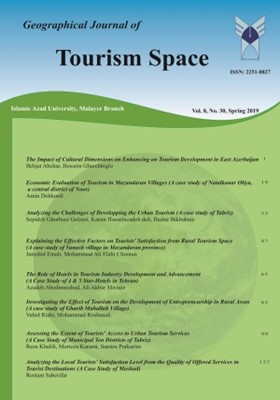Study of the Effect of Cultural Factors on the Development of the Tourism Industry in East Azerbaijan-e sharghi
Subject Areas :
Behjat Abchar
1
*
,
Hossein Gharehbiglo
2
1 - Department of Management, Management, Ajabshir Branch, Islamic Azad University, Ajabshir, Iran.
2 - Department of Management, Management, Ajabshir Branch, Islamic Azad University, Ajabshir, Iran.
Received: 2017-04-01
Accepted : 2019-04-18
Published : 2019-05-22
Keywords:
development,
boosting tourism,
cultural dimensions,
East Azarbaijan-e sharghi,
Abstract :
Tourism is very important. By incentives, tourists have different expectations of travel products and results in determining the development strategies of many destinations is considerable and planners and policymakers the knowledge that the destinations of tourism is and what features should have. The main objective of this study is to enhance and strengthen the impact of the cultural aspects of tourism in the province. The research method is descriptive and analytical, field data collection and data collected through questionnaires. The population of this study are tourists East Azerbaijan-e sharghi, which between them according to unlimited community sample of 276 people were chosen to distribute questionnaires. Probability sampling method available, and test hypotheses using regression software is spss21. The results show that all hypotheses are confirmed. Probability sampling method available, and test hypotheses using regression software is spss21. The results show that all hypotheses are confirmed. Probability sampling method available, and test hypotheses using regression software is spss21. The results show that all hypotheses are confirmed.
References:
ابراهیم زاده، ع.، طارمیان، ح.، کاظمی زاد، ش. (1389). چهارمین کنگره بین المللی جغرافی دانان جهان اسلام. ایران، زاهدان.
تقوایی، م.، موسوی، س.ع.، غلامی بیمرغ، ی. (1389). تحلیلی بر توسعه گردشگری مذهبی. فصلنامه علمی – پژوهشی فضای جغرافیایی، 10(31)، 64-39.
تیموثی، دالن، نیاوپان، جیان پی(1392)، میراث فرهنگی و گردشگری در کشورهای در حال توسعه، ترجمه اکبر پورفرج و جعفر باپیری. تهران:مهکامه.
خاکساری، ع. (1391). برنامه ریزی توسعه گردشگری در ایران: ویژگیها و نقش برنامه ریزان توسعه گردشگری در کشورهای اسلامی. فصلنامه علوم اجتماعی، (58)، 33-1.
رنجبریان، ب.، زاهدی، م. (1386). خدمات صنعت گردشگری. اصفهان، انتشارات چهار باغ.
زنگی آبادی، ع.، محمدی، ج.، زیرک باش، د. (1385). تحلیل بازار گردشگری داخلی شهر اصفهان. مجله جغرافیا و توسعه، 156-131.
زیارتیعزیز، ا. (2011)؛ گردشگری دینی درآیات وروایات؛ همایش بین المللی گردشگری دینی و توسعه فرهنگ و زیارت؛ مشهد.
صدر موسوی، م.، دخیلی کهنمویی، ج. (1384). ارزیابی وضعیت تسهیلات گردشگری استان آذربایجان شرقی از دید گردشگران. پژوهشهای جغرافیایی، (61)، 143-129.
ضرغام، ح. (1376). راهکارایی برای توسعه جهانگردی در جمهوری اسلامی ایران. مجموعه مقالات نخستین همایش جهانگردی در جمهوری اسلامی ایران، جلد 1، 404-299.
طیبی، س.ک.، بابکی، ر.، جباری، ا. (1386). بررسی رابطه توسعه گردشگری و رشد اقتصادی در ایران (1383-1338). پژوهشنامهی علوم انسانی و اجتماعی "ویژه اقتصاد"، 7(26)، 110-83.
کاظمی، م. (1387). تحلیل ادراک شهروندان زاهدانی در توسعه گردشگری چابهار. جغرافیا و توسعه، (12)، 100-81.
کاظمی، م.، کاظمی، س. (1389). بررسی آثار فرهنگی توسعه گردشگری و نقش آن در تقویت فرهنگ ملی با نگاهی به برنامه چهارم توسعه. 17-1.
مدهوشی، م.، ناصر پور، ن. (1382). ارزیابی موانع توسعه صنعت گردشگری در استان لرستان. فصلنامه پژوهشنامه بازرگانی، (28)، 58-25.
همایون، محمدهادی؛ (1391)؛ جهانگردی؛ ارتباطی میانفرهنگی: مطالعه تطبیقی الگوی غربی معاصر و الگوی اسلامی؛ انتشارات دانشگاه امام صادق(ع)، تهران؛ چاپ دوم.
Arzeni, S. (2009). The Impact of Culture on Tourism. OECD Centre for Entrepreneurship, SMEs and Local Development, 1-159.
Dritsakis, N. (2004).Tourism as a long-run economic growth factor: An empirical investigation for Greece using causality analysis. Tourism Economics, 10(3), 305–316.
Lane, Bernard (1994), “Sustainable rural tourism strategies: a tool for development and conservation”. Journal of Sustainable Tourism. Vol 2, Nos. 1 & 2.: 12-18.
Machintosh, R., & Ritchie, R. B. (1995). Tourism principle, practice, philosophies. United States of America: John Wiley & sons, Inc.
Richards,G. (2002). Torism and the world of Culture and Heritage. tourism Receration Research, (25)1, 9-17.
Gnoth, J., Zins, A.H. (2013). Developing a tourism cultural contact scale. Journal of Business Research 66, 738–744.
Hall, C. M., page, J. (2001). The Geography of tourism and Recreation, Routledge.
(2009). Tourism: Creating Opportunities in Challenging Times. UNTWO News: Magazine of the World Tourism Organization XXIII (1), 1-57.
UNWTO World Tourism Barometer (2015). [on-line] Available: http://www.e-unwto.org/loi/wtobarometereng [07/26/2016].
Van Beynen , (2007). Tourism Industry. The Christchurch Press.
Williams, A. (2006). Tourism Hospitality Marketing : Fantasy, Feeling and Fun. International Journal of Contemporary Hospitality Management, (18)6,482-491.
Zhong, L., et al. (2011). Research on environmental impacts of tourism in China: Progress and prospect. Journal of Environmental Management 92, 2972-2983.
_||_

